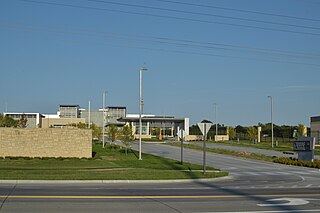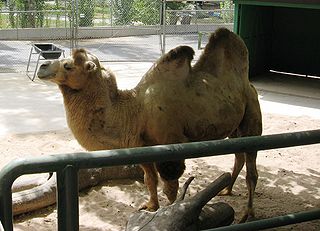
People for the Ethical Treatment of Animals is an American animal rights nonprofit organization based in Norfolk, Virginia, and led by Ingrid Newkirk, its international president.

The Animal Welfare Act was signed into law by President Lyndon B. Johnson on August 24, 1966. It is the main federal law in the United States that regulates the treatment of animals in research and exhibition. Other laws, policies, and guidelines may include additional species coverage or specifications for animal care and use, but all refer to the Animal Welfare Act as the minimally acceptable standard for animal treatment and care. The USDA and APHIS oversee the AWA and the House and Senate Agriculture Committees have primary legislative jurisdiction over the Act. Animals covered under this Act include any live or dead cat, dog, hamster, rabbit, nonhuman primate, guinea pig, and any other warm-blooded animal determined by the Secretary of Agriculture for research, pet use or exhibition. Excluded from the Act are birds, rats of the genus Rattus, mice of the genus Mus, farm animals, and all cold-blooded animals.

The Oregon National Primate Research Center (ONPRC) is one of seven federally funded National Primate Research Centers in the United States and has been affiliated with Oregon Health and Science University (OHSU) since 1998. The center is located on 200 acres (0.81 km2) of land in Hillsboro, Oregon. Originally known as the Oregon Regional Primate Research Center (ORPRC), it was the first of the original seven primate centers established by the National Institutes of Health (NIH). The research center is administered and funded by the National Center for Research Resources, receiving $11 million in federal grants annually.
The Tri-State Zoological Park was a 16-acre (6.5 ha) zoo located in Cumberland, Maryland, United States. The nonprofit zoo opened in 2003, and contains mainly exotic animals rescued or in need of homes, including lions, tigers, primates, various exotics, birds and reptiles.

The Center for Elephant Conservation (CEC) is a 200-acre (0.81 km2) breeding farm and retirement facility for elephants in Polk City, Florida, opened in 1995. The CEC is solely sponsored by Feld Entertainment, the holding company which operated the Ringling Bros. and Barnum & Bailey Circus from the 1960s until 2017.
Animal Outlook, formerly known as Compassion Over Killing (COK), is a nonprofit animal advocacy organization based in Washington, D.C. It is headed since May 2021 by Executive Director Cheryl Leahy, who succeeded Erica Meier. Formed in 1995, as a high school club, their primary campaigns are to advocate against factory farming and promote vegan eating. While the group welcomes those who are interested in animal welfare who eat meat, it encourages a transition to a plant-based diet.

The Indianapolis Zoo is a 64-acre (26 ha) non-profit zoo, public aquarium, and botanical garden in Indianapolis, Indiana, United States. Incorporated in 1944, the Indianapolis Zoological Society established the first zoo at George Washington Park in 1964. The current zoo opened in 1988 at White River State Park near downtown Indianapolis. It is among the largest privately funded zoos in the U.S.

Bowmanville Zoo was a zoo in Clarington, Ontario, Canada. Founded in 1919, at the time of its closure, in 2016, it was the oldest private zoo in North America. It was a large supplier of animals to the U.S. film industry.

The National Bio and Agro-Defense Facility (NBAF) is a biosafety level 4 research laboratory in Manhattan, Kansas, operated by the United States Department of Agriculture. The facility opened in June 2023. The facility is designed to combat biological threats involving human, zoonotic, and foreign animal diseases. The NBAF replaced the aging Plum Island Animal Disease Center (PIADC) on Plum Island, New York. The primary research tenants of the facility are the Agriculture Research Service (USDA-ARS) and Animal Plant Health Inspection Service, Veterinary Services (USDA-APHIS-VS). Construction on the 574,000-square-foot (53,300 m2) facility officially began in May 2015, and was scheduled to be completed by May 2021. The ongoing COVID-19 pandemic, however, has delayed scheduled commissioning to October 2021, followed by further delays to Spring, and finally summer 2023. Operations will be fully transferred from the Plum Island facility by 2023. The facility employs between 250 and 350 people. The facility is a constituent member of the Biosafety Level 4 Zoonotic Laboratory Network, and is currently led by Alfonso Clavijo.

Wild Kingdom Train Zoo is a small zoo located in Lagoon Amusement Park, Farmington, Utah. Visible when riding the Wild Kingdom Train, the zoo is located on the banks of a pond. In 1967, the Animaland Train opened, taking guests past the various animal exhibits. The name of the attraction was changed in 1975 to the Wild Kingdom Train. The park has advertised the zoo as the second-largest zoo in Utah.

The Manila Zoo, formally known as the Manila Zoological and Botanical Garden, is a 5.5-hectare (14-acre) zoo located in Malate, Manila, Philippines. First opened on July 25, 1959, it was recently renovated and reopened on November 21, 2022.

The West Coast Game Park Safari is a walk-through safari park in Bandon, Oregon, United States. It opened in 1968, and includes snow leopards, African lions, Bengal tigers, emu, capybara, and cougars.
The Greater Wynnewood Exotic Animal Park, alternatively known as the G.W. Zoo, Tiger King Park and formerly the Garold Wayne Exotic Animal Memorial Park, was an animal park displaying predominantly tigers and other big cats in Wynnewood, Oklahoma, United States. The park garnered substantial public attention due to the 2020 Netflix documentary series Tiger King: Murder, Mayhem and Madness, which focused on park founder and owner Joe Exotic.

Big Cat Rescue Corp., also known as BCR and previously known as Wildlife on Easy Street, Inc., operates an animal sanctuary in Hillsborough County, Florida, United States, which rescues and houses exotic cats, and rehabilitates injured or orphaned native wild cats. It was founded by Don Lewis and Carole Baskin in 1995.

Envigo (en-VEE-go) is a privately held contract research organization and laboratory animal sourcer that provides live animals and related products and services to pharmaceutical and biotechnology industries, government, academia and other life science organizations engaged in animal testing. The company breeds and sells research animals – which are referred to in the industry as "research models"– including rodents, rabbits, beagles and non-human primates. Envigo is headquartered in Indianapolis, Indiana and employs more than 1,200 people at 30+ locations across North America, Europe and the Middle East.

SeaQuest Holdings, LLC better known as just SeaQuest, is an interactive marine, exotic mammal, and bird/reptile life attraction chain. It was founded by Vince Covino and features hands-on animal interactions at shopping malls throughout the United States. The company has locations in Utah, Texas, Las Vegas, New Jersey, California, Minnesota, Colorado, and Virginia. SeaQuest has attracted considerable controversy and legal issues due to concerns over its animal care standards.

Bhagavan Mahamayavi "Doc" Antle, is an American animal trainer, roadside zoo operator, and felon convicted of wildlife trafficking.
The Washington National Primate Research Center (WaNPRC) is a federally-funded biomedical research facility located on the Seattle campus of the University of Washington. The WaNPRC is one of seven National Primate Research Centers established by the National Institutes of Health in the 1960s The Washington primate center opened in 1961 and as of 2020, housed over 900 primates. The center is affiliated with the University of Washington Schools of Medicine, Public Health, affiliated research centers and the University of Washington Medical Center. It employs over 150 scientists and staff.
The University of Washington practices animal testing for a variety of purposes, including biomedical testing and paramedic training. Testing is performed by faculty from various departments across the university, and is conducted on animals including dogs, rabbits, primates, pigs, sheep, gerbils, bobcats, ferrets, and coyotes. Testing on primates is done through the Washington National Primate Research Center, which is located on campus. Animal testing at UW is overseen by the university's Institutional Animal Care and Use Committee (IACUC).
The Southwest National Primate Research Center (SNPRC) is a federally funded biomedical research facility affiliated with the Texas Biomedical Research Institute. The SNPRC became the seventh National Primate Research Center in 1999.















